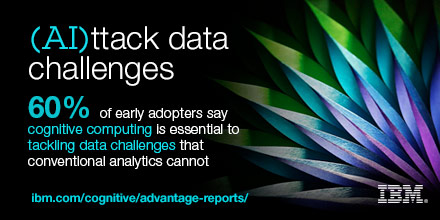Originally published at the IBM Big Data & Analytics Hub, December 8, 2016
Susanne Hupfer, Senior Consultant, Thought Leadership, IBM
Data is both the fuel and the byproduct of digital transformation. A 2011 EMC-sponsored IDC study projected that the digital universe will reach the equivalent of 1.7 MB of information created for every human on the planet by 2020, every second of every day. This digital fire hose represents a huge opportunity for data mining, but its complexity and magnitude can be overwhelming. A 2014 SAP-provided article for MIT Technology Review includes an SAP infographic stating that an estimated 99.5 percent of digital data is never analyzed.
Clearly, organizations need to excel at deriving actionable insights from the vast data flows of the digital revolution to gain a competitive edge—but how?
Unlocking the value of digital data
Cognitive technologies including artificial intelligence (AI) are rapidly coming into play as ways to help unlock the value of digital data and augment human intelligence and decision making. AI systems can rapidly consume and analyze large volumes of structured and unstructured data, generate hypotheses, formulate possible answers to questions and provide predictions and recommendations that experts can use to guide their decisions.
Consider a finding in the new IBM study, The Cognitive Advantage report. Among more than 600 decision makers worldwide who are actively engaged in or planning cognitive computing and AI initiatives, 58 percent of early adopters regard cognitive computing as a must-have initiative for organizations to remain competitive within the next few years. And the same proportion says that cognitive computing is essential to digital transformation.
Deriving deep insight with analytics at the core
 Data and analytics are the lifeblood of AI initiatives. Early adopters are already analytically mature, with three-quarters reporting they typically use advanced analytics—predictive, prescriptive or both—in their organizations. Nine in 10 say that big data and analytics along with cloud computing, mobile and security will play an important role in their cognitive initiatives within two years.
Data and analytics are the lifeblood of AI initiatives. Early adopters are already analytically mature, with three-quarters reporting they typically use advanced analytics—predictive, prescriptive or both—in their organizations. Nine in 10 say that big data and analytics along with cloud computing, mobile and security will play an important role in their cognitive initiatives within two years.
Cognitive technologies are widely regarded by early adopters as a key to deriving deeper insights from their data. Note these two findings from the same report:
- Sixty percent of early adopters say cognitive technology is essential to tackling data challenges that conventional analytics cannot.
- More than half of early adopters believe cognitive technology will unlock the hidden value of their organization’s dark data.
While big data and analytics are fueling AI efforts, they also pose challenges:
- Fifty-four percent of early adopters say that data issues such as quality and volume along with integrating and converting data represent major challenges for adopting cognitive technologies.
- Moreover, 57 percent of early adopters report a skills gap for the data experts—such as data scientists and data analysts—who can help tackle these data-related challenges.
Achieving outcomes of cognitive initiatives
Improved customer service is a top outcome from cognitive initiatives. Almost half of users report they’re achieving this outcome, and the same number reports personalizing customer and user experiences—for example, providing customers with targeted recommendations and offers—as top outcomes.
Productivity and efficiency improvements are other significant outcomes. Nearly half of users reported those gains. And 46 percent of users say that cognitive technologies help their organization improve decision making and planning. Business growth is another big motivator, as 41 percent of users said cognitive technologies are helping them expand their business into new markets.
Learn more about early adopters of cognitive technologies from the IBM Cognitive Advantage study. And find out how cognitive technologies are being used to increase customer engagement.

